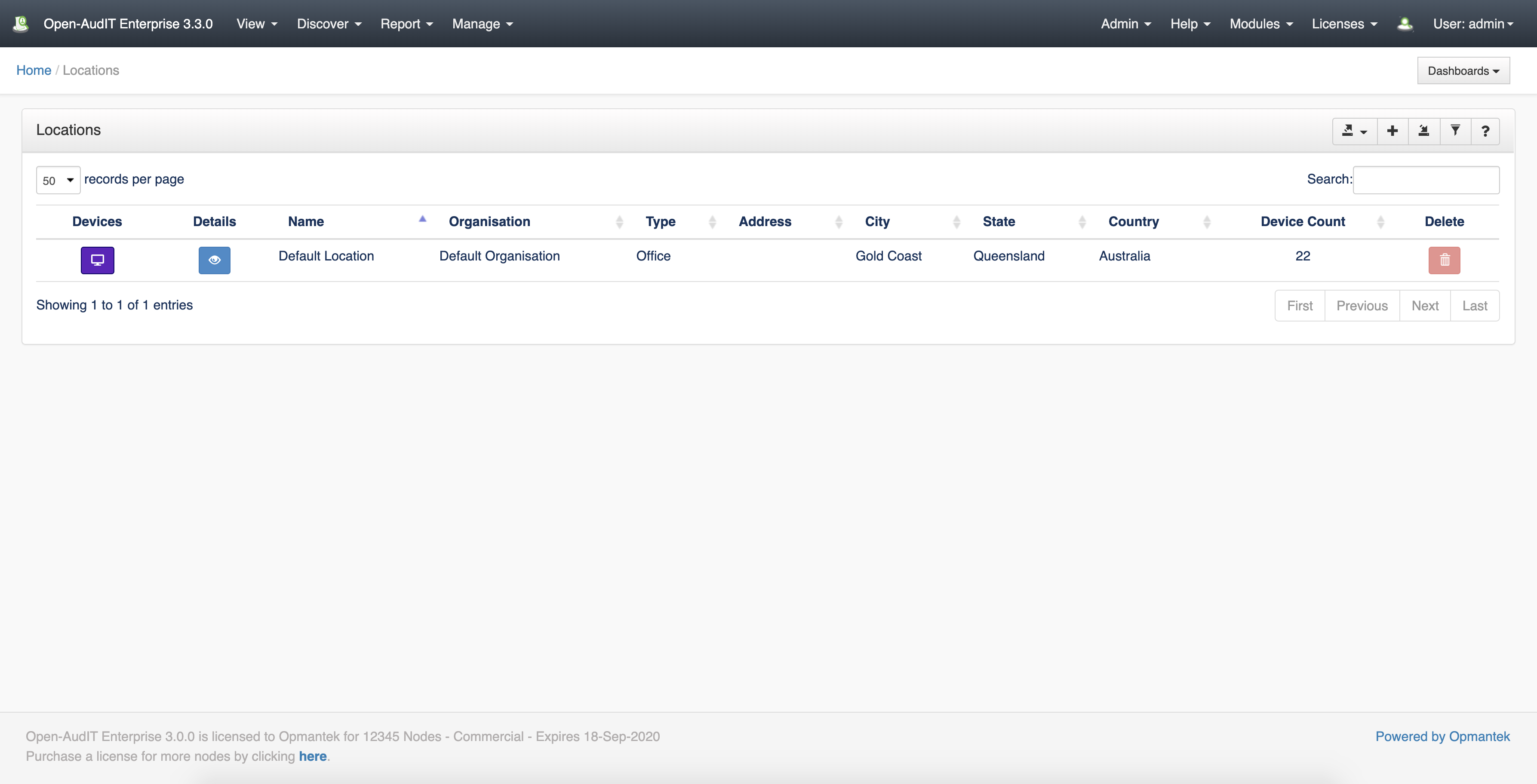| Table of Contents |
|---|
*(Under Review for V2)
Introduction
A location is a physical address that can have devices associated with it. You can assign it coordinates and if there are devices assigned, the location will appear on the Map in Open-AudIT Enterprise.
...
Locations are used to assign devices to and will appear on the map in Open-AudIT Enterprise if they have any devices.
Creating a Location
Join Paul McClendon, an Opmantek Support Engineer, as he demonstrates how to create locations in Open-AudIT
| Widget Connector | ||||||
|---|---|---|---|---|---|---|
|
To make another location go to menu: Manage -> Locations -> Create Location.
View Location Details
...
Database Schema
| Code Block | ||||
|---|---|---|---|---|
| ||||
Create Table: CREATE TABLE `locations` (
`id` int(10) unsigned NOT NULL AUTO_INCREMENT,
`name` varchar(200) NOT NULL DEFAULT '',
`org_id` int(10) unsigned NOT NULL DEFAULT '1',
`type` enum('Airforce','Airport','Ambulance Station','Army','Cloud','Conference Center','Court House','Data Center','Depot','District','Doctors Office','Embassy','Factory','Fire Station','Guard','Head Office','High School','Hospital','Hotel','House','Library','Light House','Marina','Mobile Phone Tower','Motel','Navy','Newsagent','Nursing Home','Observatory','Office','Oil Rig','Police','Power Plant','Power Substation','Prison','Radio Station','Regional','Resort','Retail','School','Security','Stadium','Train Station','Travel Agency','TV Station','University','Warehouse','Workshop') NOT NULL DEFAULT 'Office',
`room` varchar(100) NOT NULL DEFAULT '',
`suite` varchar(100) NOT NULL DEFAULT '',
`level` varchar(100) NOT NULL DEFAULT '',
`address` varchar(100) NOT NULL DEFAULT '',
`suburb` varchar(100) NOT NULL DEFAULT '',
`city` varchar(100) NOT NULL DEFAULT '',
`district` varchar(100) NOT NULL DEFAULT '',
`region` varchar(100) NOT NULL DEFAULT '',
`area` varchar(100) NOT NULL DEFAULT '',
`state` varchar(100) NOT NULL DEFAULT '',
`postcode` varchar(10) NOT NULL DEFAULT '',
`country` varchar(100) NOT NULL DEFAULT '',
`tags` varchar(250) NOT NULL DEFAULT '',
`phone` varchar(20) NOT NULL DEFAULT '',
`picture` varchar(100) NOT NULL DEFAULT '',
`latitude` float(10,6) NOT NULL,
`longitude` float(10,6) NOT NULL,
`geo` varchar(200) NOT NULL DEFAULT '',
`edited_by` varchar(200) NOT NULL DEFAULT '',
`edited_date` datetime NOT NULL DEFAULT '2000-01-01 00:00:00',
PRIMARY KEY (`id`)
) ENGINE=InnoDB AUTO_INCREMENT=3 DEFAULT CHARSET=utf8; |
Example Database Entry
Locations are stored in the database in the "locations" table. A typical entry will look as below.
...
| theme | Eclipse |
|---|---|
| language | text |
...
Database Schema
The database schema can be found in the application is the user has database::read permission by going to menu: Admin -> Database -> List Tables, then clicking on the details button for the table.
API / Web Access
You can access the
...
collection using the normal Open-AudIT JSON based API. Just like any other collection. Please
...
API Routes
Request Method | ID | Action | Resulting Function | Required Permission | URL Example | Notes | Example Response |
|---|---|---|---|---|---|---|---|
| GET | n | collection | locations::read | /locations | Returns a list of locations. | locations_collection.json | |
| GET | y | read | locations::read | /locations/{id} | Returns a location's details. | locations_read.json | |
| PATCH | y | update | locations::update | /locations/{id} | Update an attribute of a locations entry. | locations_patch.json | |
| POST | n | create | locations::create | /locations | Insert a new locations entry. | locations_create.json | |
| DELETE | y | delete | locations::delete | /locations/{id} | Delete a locations entry. | locations_delete.json |
Web Application Routes
...
...
...
...
...
...
...
see The Open-AudIT API documentation for further details.





